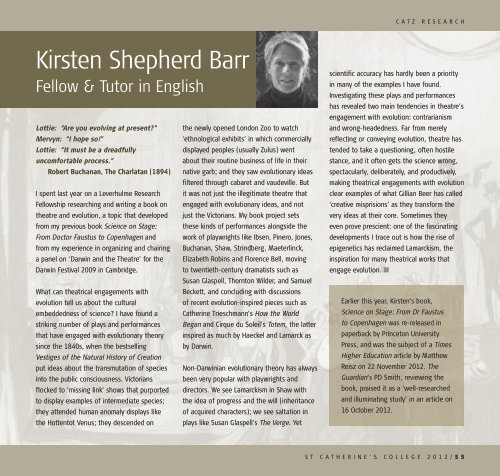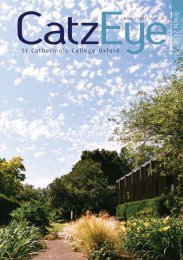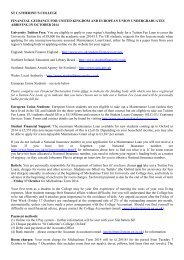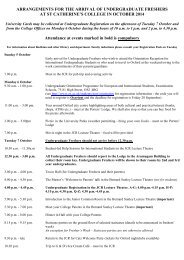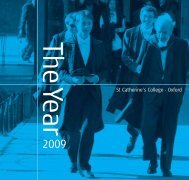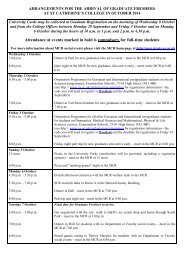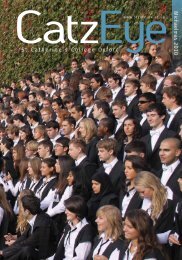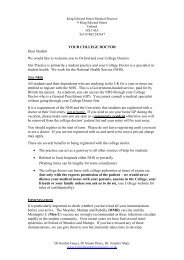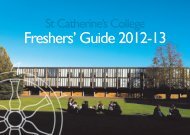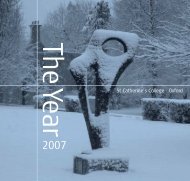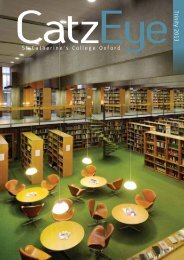Download PDF - St. Catherine's College - University of Oxford
Download PDF - St. Catherine's College - University of Oxford
Download PDF - St. Catherine's College - University of Oxford
You also want an ePaper? Increase the reach of your titles
YUMPU automatically turns print PDFs into web optimized ePapers that Google loves.
CATZ RESEARCH<br />
Kirsten Shepherd Barr<br />
Fellow & Tutor in English<br />
Lottie: “Are you evolving at present?”<br />
Mervyn: “I hope so!”<br />
Lottie: “It must be a dreadfully<br />
uncomfortable process.”<br />
Robert Buchanan, The Charlatan (1894)<br />
I spent last year on a Leverhulme Research<br />
Fellowship researching and writing a book on<br />
theatre and evolution, a topic that developed<br />
from my previous book Science on <strong>St</strong>age:<br />
From Doctor Faustus to Copenhagen and<br />
from my experience in organizing and chairing<br />
a panel on ‘Darwin and the Theatre’ for the<br />
Darwin Festival 2009 in Cambridge.<br />
What can theatrical engagements with<br />
evolution tell us about the cultural<br />
embeddedness <strong>of</strong> science? I have found a<br />
striking number <strong>of</strong> plays and performances<br />
that have engaged with evolutionary theory<br />
since the 1840s, when the bestselling<br />
Vestiges <strong>of</strong> the Natural History <strong>of</strong> Creation<br />
put ideas about the transmutation <strong>of</strong> species<br />
into the public consciousness. Victorians<br />
flocked to ‘missing link’ shows that purported<br />
to display examples <strong>of</strong> intermediate species;<br />
they attended human anomaly displays like<br />
the Hottentot Venus; they descended on<br />
the newly opened London Zoo to watch<br />
‘ethnological exhibits’ in which commercially<br />
displayed peoples (usually Zulus) went<br />
about their routine business <strong>of</strong> life in their<br />
native garb; and they saw evolutionary ideas<br />
filtered through cabaret and vaudeville. But<br />
it was not just the illegitimate theatre that<br />
engaged with evolutionary ideas, and not<br />
just the Victorians. My book project sets<br />
these kinds <strong>of</strong> performances alongside the<br />
work <strong>of</strong> playwrights like Ibsen, Pinero, Jones,<br />
Buchanan, Shaw, <strong>St</strong>rindberg, Maeterlinck,<br />
Elizabeth Robins and Florence Bell, moving<br />
to twentieth-century dramatists such as<br />
Susan Glaspell, Thornton Wilder, and Samuel<br />
Beckett, and concluding with discussions<br />
<strong>of</strong> recent evolution-inspired pieces such as<br />
Catherine Trieschmann’s How the World<br />
Began and Cirque du Soleil’s Totem, the latter<br />
inspired as much by Haeckel and Lamarck as<br />
by Darwin.<br />
Non-Darwinian evolutionary theory has always<br />
been very popular with playwrights and<br />
directors. We see Lamarckism in Shaw with<br />
the idea <strong>of</strong> progress and the will (inheritance<br />
<strong>of</strong> acquired characters); we see saltation in<br />
plays like Susan Glaspell’s The Verge. Yet<br />
scientific accuracy has hardly been a priority<br />
in many <strong>of</strong> the examples I have found.<br />
Investigating these plays and performances<br />
has revealed two main tendencies in theatre’s<br />
engagement with evolution: contrarianism<br />
and wrong-headedness. Far from merely<br />
reflecting or conveying evolution, theatre has<br />
tended to take a questioning, <strong>of</strong>ten hostile<br />
stance, and it <strong>of</strong>ten gets the science wrong,<br />
spectacularly, deliberately, and productively,<br />
making theatrical engagements with evolution<br />
clear examples <strong>of</strong> what Gillian Beer has called<br />
‘creative misprisions’ as they transform the<br />
very ideas at their core. Sometimes they<br />
even prove prescient: one <strong>of</strong> the fascinating<br />
developments I trace out is how the rise <strong>of</strong><br />
epigenetics has reclaimed Lamarckism, the<br />
inspiration for many theatrical works that<br />
engage evolution. n<br />
Earlier this year, Kirsten’s book,<br />
Science on <strong>St</strong>age: From Dr Faustus<br />
to Copenhagen was re-released in<br />
paperback by Princeton <strong>University</strong><br />
Press, and was the subject <strong>of</strong> a Times<br />
Higher Education article by Matthew<br />
Reisz on 22 November 2012. The<br />
Guardian’s PD Smith, reviewing the<br />
book, praised it as a ‘well-researched<br />
and illuminating study’ in an article on<br />
16 October 2012.<br />
ST CATHERINE’S COLLEGE 2012/55


